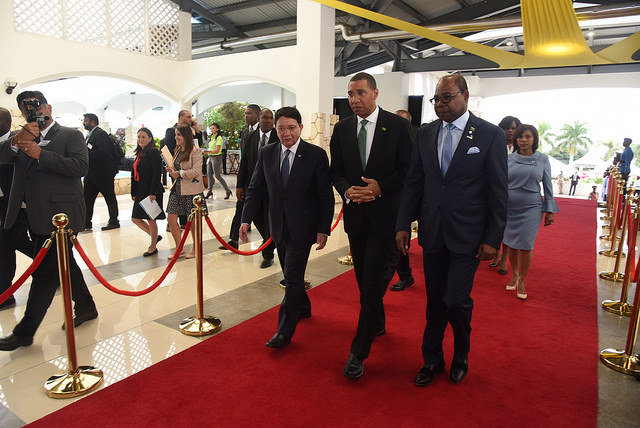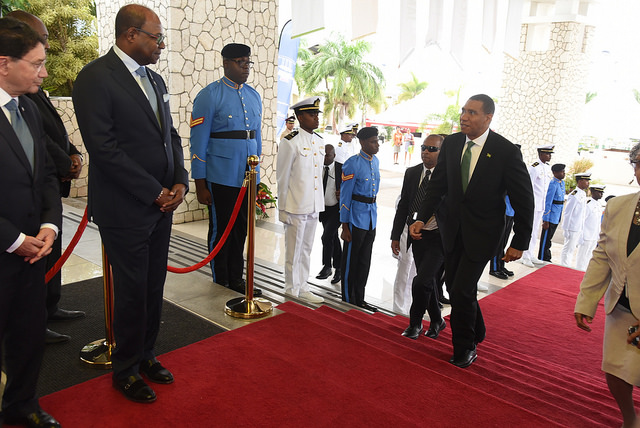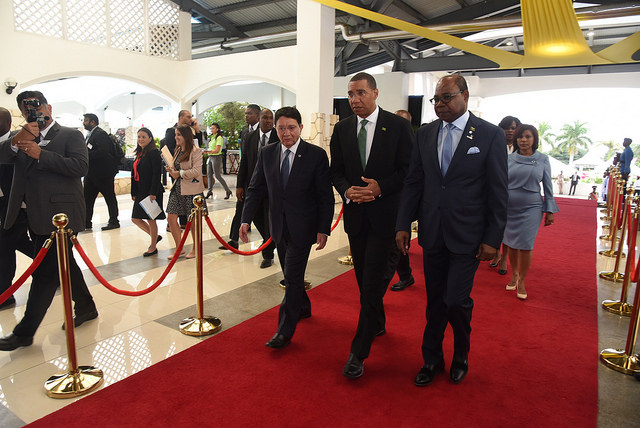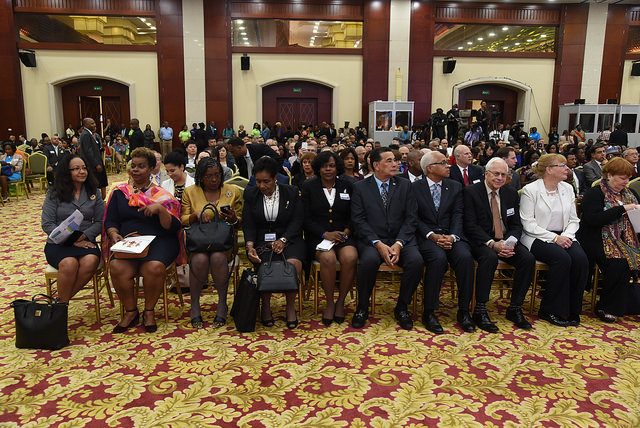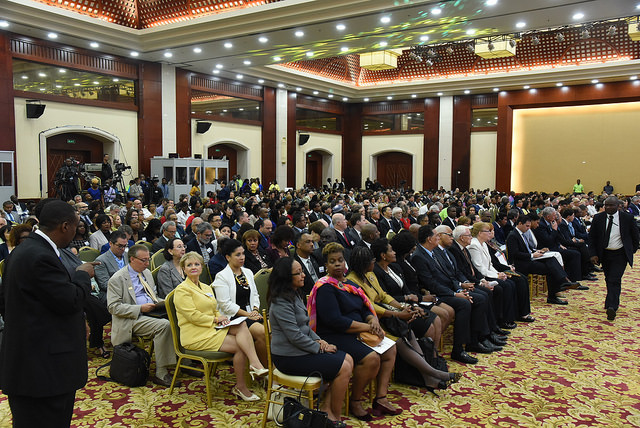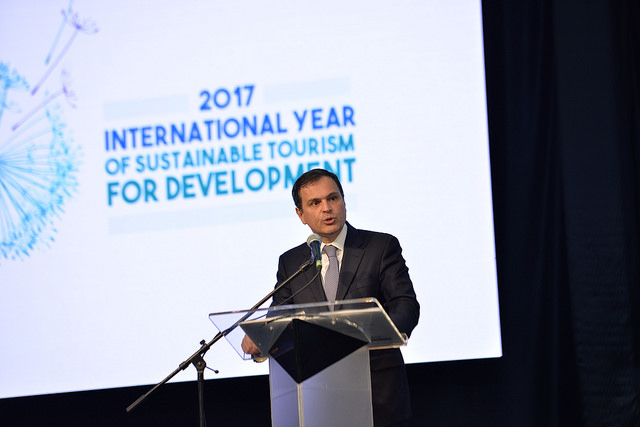
Tourism and the global sustainable development: Minister Bartlett’s remarks on Day 2 of UNWTO conference
Jamaica’s Tourism Minister Hon. Edmund Bartlett delivered the following remarks on Day 2 of UNWTO Global Conference:
• The quest to achieve sustainable development dominates the national policy agendas of most countries across the world. The United Nations in 2016 expanded its original global development mandate – the Millennium Development Goals – to give increased focus to a wide range of areas that are considered urgent to a successful global agenda for sustainable development.
• One hundred and ninety-three (193) World leaders adopted the 17 Sustainable Development Goals of the 2030 Agenda for Sustainable Development, indicating their commitment to mobilize efforts to eradicate poverty, fight inequalities and tackle climate change while ensuring that no one is left behind.
• Globally, tourism has been identified as one of the main catalysts for promoting sustainable development; so much so that the United Nations 70th General Assembly has designated 2017 as the International Year of Sustainable Tourism for Development.
• This designation provides a unique opportunity for tourism principals and policymakers to raise awareness of the contribution of tourism to sustainable development, while mobilizing all stakeholders to work together in making tourism a catalyst for positive change.
• In pursuing its mandate of aligning tourism with sustainable development, the United Nations and its network of global partners have committed to supporting a change in policies, business practices and consumer behaviour towards a more viable and inclusive tourism sector that can contribute to the attainment of the Universal 2030 Agenda for Sustainable Development and the Sustainable Development Goals (SDGs).
• This is particularly so in areas such as: promoting inclusive and sustainable economic growth, social inclusiveness, employment and poverty reduction, resource efficiency, environmental protection and climate change, cultural values, diversity and heritage and mutual understanding, peace and security.
Promoting SDGs
• Based on the United Nations conceptual framework, sustainable tourism strategies dominating the global agenda have been designed within the context of the broader discourse which seeks to position the global economic sectors and industries to maximize their potential to contribute to sustainable development.
• It has been, by now, widely accepted that global tourism has the potential to contribute, directly or indirectly to the achievement of Sustainable Development Goals such as:
o SDG 1 – Poverty eradication;
o SDG 3 – Promoting good health and well-being;
o SDG 5 – Promoting gender equality
o SDG 8 – P Promoting decent work and economic growth;
o SDG 7_ Promoting affordable and clean energy;
o SDG 9 – The development of industry, innovation and infrastructure
o SDG 10 – Reducing Inequalities
o SDG 11 – Promoting sustainable cities and communities; and
o SDG 12 – Promoting responsible consumption and production.
International Tourism in 2016
• The tourism sector continues to be a catalyst for economic growth and development among developing countries. The recently released WTTC Travel and Tourism Economic Impact 2017 Report found that despite facing increased threats related to global terrorism and political instability in many countries, Travel & Tourism continued to show its resilience in 2016, contributing direct GDP growth of 3.1% and supporting 6 million net additional jobs in the sector.
• In total, Travel & Tourism generated US$7.6 trillion (10.2% of global GDP) and 292 million jobs in 2016, equivalent to 1 in 10 jobs in the global economy. The sector accounted for 6.6% of total global exports and almost 30% of total global service exports.
• Growth in Travel & Tourism in 2016 outpaced that of the global economy (2.5%) for the 6th consecutive year. Additionally, in 2016, direct Travel & Tourism GDP growth not only outperformed the economy-wide growth recorded in 116 of the 185 countries covered by the annual economic impact research (including in major Travel & Tourism economies such as Australia, Canada, China, India, Mexico and South Africa) but it also was stronger than the growth recorded in the financial and business services, manufacturing, public services, retail and distribution and transport sectors.
International Tourism in 2017
• The data compiled for 2017 have so far revealed that international tourist arrivals worldwide grew by 6% between January to April when compared to the corresponding period last year, with business confidence reaching its highest levels in a decade. Destinations worldwide received 369 million international tourists (overnight visitors) in the first four months of the year, 21 million more than in the same months of 2016 (+6%), according to the latest UNWTO World Tourism Barometer.
• The data also indicate that many non-traditional countries are becoming more competitive and are controlling great shares of the global market. The top ten fastest growing tourist destinations this year are: Palestine, Egypt, Northern Mariana Islands, Iceland, Tunisia, Vietnam, Uruguay, Nicaragua and Mongolia and Israel.
• The impressive arrival figures for 2017 have been in-keeping with a consistent trend in international tourism growth. Indeed, the current volume, speed and reach of travel are unprecedented. International tourist arrivals increased from 25.3 million in 1950 to 1138 million in 2014 to 1184 million in 2015 to 1235 million in 2016. The projection is for that trend to continue throughout 2017.
Tourism and Sustained Economic Growth
• As one of the largest and fastest growing economic sectors in the world, tourism creates jobs, drives exports, and generates prosperity across the world. As such, tourism is well-positioned to foster sustained economic growth at all levels and provide direct and indirect incomes for billions around the world.
• Many developing countries have managed to expand their participation in the global economy through development of globally competitive tourism products. Indeed, tourism is the only export sector where the consumer travels to the exporting country, which provides opportunities for the poor to become exporters through the sale of goods and services to foreign tourists.
• Findings show that the development of the tourism industry in many developing and least developed countries (LDCs) has become the most viable and sustainable option for economic development, and in some countries, the main source of foreign exchange earnings. In 2014, Least Developed Countries (LDCs) received US$16.4 billion in exports from international tourism, up from US$2.6 billion in 2000, making the sector an important pillar of their economies (7% of total exports) and helping some to graduate from the LDC status. Tourism is also labour-intensive and supports a diverse and versatile labour market.
• The tourism industry is such a strong pillar of economic growth and development among Developing Countries mainly because of the economic linkages and diversification the sector promotes within host economies. The tourism value chain can incorporate many sectors in an economy.
• Its promotion will require the construction and operation of hotels, restaurants and other tourism-related facilities through backwards linkages and the development of basic infrastructure services, such as energy, telecommunications and environmental services; agriculture, manufacturing and other support services.
Tourism Supports Cross-Sectoral Growth
• Tourism can also create a wide range of forward linkages with sectors supplying services consumed by tourists. These include financial, telecommunications, retail, recreational, cultural, personal, hospitality, security and health services.
• In addition, countries wishing to strengthen their tourism sector will need to develop other tourism-supporting infrastructure, such as airports, proper roads, ports, hospitals and banks, which are essential for providing access to high-quality services and creating a competitive tourism destination.
• All of these tourism-related activities produce positive spill over effects in many Developing economies.
Tourism as a catalyst for local economic development (LED) and community renewal
• Sustainable tourism, which benefits and engages local communities, can provide a source of livelihood, strengthen cultural identities and spur entrepreneurial activities, thereby helping to prevent violence and conflict to take root and consolidate peace in post-conflict societies. Additionally, as tourism revolves around billions of encounters between people of diverse cultural backgrounds, the sector can foster multicultural and inter-faith tolerance and understanding, laying the foundation for more peaceful societies.
• Sustainable tourism development, and its impact at community level, can also be linked with promoting environmental sustainability through the adoption of green technologies and also with promoting good health and well-being through corporate social responsibility (CSR) strategies that provide social services and outreach to host communities. Sustainable tourism should also maintain a high level of tourist satisfaction and ensure a meaningful experience to the tourists, raising their awareness about sustainability issues and promoting sustainable tourism practices amongst them.
• .Tourism can also be a powerful tool for community development and reducing inequalities if it engages local populations and all key stakeholders in its development. Tourism can contribute to urban renewal and rural development and reduce regional imbalances by giving communities the opportunity to prosper in their place of origin.
The importance of this Conference
• Based on the narrative that I have just outlined, the cumulative impact of sustainable tourism for the beneficiary economies will be increased investments (both domestic and foreign); growth of industries, MSMES and community-based enterprises; accelerated job creation; sustained economic livelihoods; increased exports; more foreign exchange; environmental conservation and general symbiosis all linked to sustainable development through poverty reduction and environmental sustainability.
• This vision for achieving sustainable development through tourism will, however, not be achieved unless there is the informed participation of all relevant stakeholders, as well as strong political leadership to ensure wide participation and consensus building. It is within this context that we have organized this momentous event to achieve fruitful engagements on discussing the challenges confronting global tourism and the way forward.
